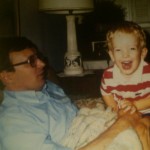
The school year was coming to a close and my son Andrew’s sixth grade class was scheduled for an all day field trip. But when we got to school, Andrew announced he was not going and refused to get out of the car. I was on my way to work and was not ready for a discussion.
“Andrew, you have to go to school. Get out of the car!” I insisted.
But Andrew has never been one to be easily persuaded. As we sat in a stalemate, a teacher passed by and joined the discussion. She showed more patience and asked a question I should have asked, “Andrew it’s going to be lots of fun. Why don’t you want to go?”
By this point Andrew was in tears. “I’ll just be spending all of my time with Paul and the other kids are calling us gay.”
“Oh Andrew, don’t worry” the teacher consoled, “you are not gay! It will be OK.”
She had the right initial question, and she got Andrew out of the car, but I wasn’t so sure I liked her response. “How do we know he is not gay?” I thought. “And what if he is?” Somehow I knew we had lost a teachable moment. It was a missed opportunity.
Fifteen years after that morning in the middle school parking lot, my wife and I sat in our kitchen one night and listened as Andrew told us he is gay. For fifteen years we hadn’t mentioned that morning, while Andrew struggled in silence and solitude. Was there something that could have been said that morning that would have been an opening for conversation earlier? This is the question I continue to wrestle with. I don’t have all the answers, but I can think of at least three things I know with certainty, three things I wish I had communicated sooner.
First, I have no idea why some of us are straight and some of us are gay, but I do believe that no one can choose to be gay just like you can’t choose your gender. You do not choose it, and you cannot change it.
Second, to those who are gay: it’s not your fault. There is no blame in being gay. There is no sin in being gay. It’s not your fault, it’s not anyone’s fault. It’s not a matter of fault; it is a matter of gift. It’s not an illness; it is by God’s design.
Lastly, as a parent I have to say, “It’s OK if you are gay. We love and support you, unconditionally.” Our family and our home will be a safe place for anyone who is gay, whether they are our children or our children’s friends.
If I had said those things years ago, maybe I could have spared Andrew some of the pain of finding his identity. Yet this is a conversation we should have with all our children, gay or straight. If they are gay, this might just save their life. If they are straight, they might not be the one to bully the gay person over the edge or might just be that one that befriends someone with the word, “It’s OK. I accept you as you are.” We cannot afford more missed opportunities.
This may be easy for me to say now because we have a gay child, but we also have three straight children who have not turned their back on their brother. I cannot say that I am proud of my son for being gay – he did nothing, he had no choice. But I can say that I am very proud of the way he has taken this challenge head on with honesty and dignity. And I am also proud of my family that has stood by Andrew.
As I said, I have no idea why some of us are straight and some of us are gay, but I also have no idea why some of us are so homophobic and some of us are so perfectly comfortable with accepting him as he is. Homosexuality is not a choice, but homophobia is. Since the start of this blog, many people who used to ask, “how is Andrew?” have stopped asking about him. I don’t know if they think we are uncomfortable talking about him or if they are uncomfortable talking about him. But they have stopped talking, and that is not the right choice.
I am not uncomfortable talking about my son, because I love my son. Do I wish he wasn’t gay? That is such a small part of who he is, but the pieces of the fabric of who he is are so interwoven that if I pulled that one piece out I have no idea what else of Andrew I would lose. Would he still be able to preach with the same intensity? Would his piano playing still have the same feeling? The Andrew I know and love has always been gay, but I’ve only known for a year.
This “issue” is not going to simply go away, and not talking about it is not an acceptable answer. Much of the pain and anguish that LGBT children in our churches bear is needlessly borne alone and in silence. The saying goes, “If you are not part of the solution, you are part of the problem.” Homophobia is a problem. Will you be part of the solution? If so, we need to talk.